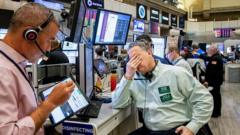The latest tariffs introduced by the Trump administration have sparked a significant sell-off in US government bonds, raising interest rates and increasing fears of a looming recession.
**US Government Debt Faces Turmoil Amid Trump Tariff Policy**

**US Government Debt Faces Turmoil Amid Trump Tariff Policy**
Amid rising tensions from tariff policies, investors express skepticism towards US government bonds.
As the Trump administration’s tariffs take effect, investor confidence in the US economy is rapidly declining, leading to a substantial sell-off of US government debt. On Wednesday, the yield on US bonds—the traditional refuge for investors during economic turmoil—soared to 4.5%, the highest level since February, making borrowing more costly for the US government.
The new tariffs, which apply to imports from 60 countries and include a staggering 104% tax on Chinese products, have incited retaliatory measures from China, which announced an 84% levy on American goods. Stock markets have reacted negatively to these developments, falling sharply as uncertainty grows over the economic landscape.
The impact of this increase in bond yields—essentially what it costs the US government to borrow money—poses a significant challenge. The surge is troubling especially as it reflects a broader loss of faith in US assets. Analysts suggest that the Federal Reserve might need to intervene to stabilize the markets, potentially reminiscent of the Bank of England's decisive actions in 2022 during another economic crisis. George Saravelos from Deutsche Bank stated that emergency purchases of US Treasuries could be the only viable option left for the Fed if market conditions worsen.
Simon French, chief economist at Panmure Liberum, highlighted that the US could face a potential recession, raising its likelihood from 40% to 60%. The economic uncertainty induced by tariffs threatens to disrupt global supply chains, as domestic companies are faced with higher import costs, which may subsequently drive inflation.
With speculation surrounding the motivations of investors selling off US bonds, it is suggested that nations like China, which holds about $759 billion in US debt, could be part of the trend. Saravelos warned of the dangers of escalating financial tensions, cautioning there could be no clear victors in such a conflict, only detrimental impacts on the global economy.
As the situation unfolds, the question remains: will the US steer clear of recession, or are we witnessing the early signs of deeper economic troubles?




















